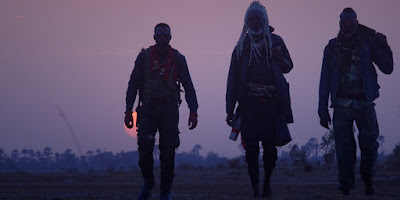By Carol Borden
Evan Jackson Leong Snakehead (USA, 2021)
Snakehead chronicles the life of Sister Tse (Shuya Chang) after she has paid a snakehead--a human smuggler similar to a coyote--to bring her to New York so she can find her daughter. Sister Tse is very practical about this arrangement, so practical she works her way up the ranks of the local family holding her debt and attracts the attention of gang matriach and community benefactor, Dai Mah (Jade Wu). Sister Tzu also attracts the attention of Dai Mah’s son, Rambo (Sung Kang), who is jealous of her relationship with his mother.
Snakehead is based on the true story of infamous leader of a human trafficking ring in New York, Cheng Chui Ping, aka, Sister Ping. And it is definitely a story worth telling. But no matter how much I want to see this story and I want to like it, Snakehead is uneven. It does not feel finished. It feels like maybe it needed another draft. On one hand, I appreciate grounding the film in the community and some of the strongest elements are related to that almost documentary feel. On the other hand there is also frequently awkwardness in line delivery. Sister Tse’s narration felt rote and didn’t create a smooth narrative flow between the segments we see from her life. It feels more like dramatized segments in a documentary about someone’s life. And this makes me think about whether Snakehead might work better as a documentary than a drama / action movie. But the thing is, I want the action movie that Snakehead is trying to be. The documentary would be interesting, but the action movie that shares this world and the lives of the women inhabiting it is an amazing vision.
And there are some real strengths in the film, Ray Huang’s cinematography for instance. Shuya Chang is charismatic as Sister Tse. Sung Kang is suitably frightening as the out of control Rambo. But Jade Wu steals the film as Dah Mah, bringing an outstanding depth to her character and a flawless delivery.
Snakehead tries something new in terms of story, and I cannot appreciate that more. I hope everyone working on it keeps working on getting stories like this made. Because even if Snakehead doesn’t entirely succeed, it’s a start.













